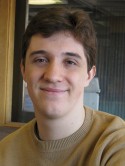George Flerovsky ‘s father-son project is based in roots but has taken wings. George and his dad founded the Toronto-area KSP Festival, a celebration of traditional music and poetry that’s based on Russia’s folk Bardic tradition. In fact, the event has grown so much that last summer it had to move to a bigger site, and this year will mark its fourth anniversary.
 “The first time, I looked on it as just helping out my dad,” George explains. “But it turned out to be a wonderful weekend beside Lake Erie, and we have kept doing it.” The festival draws all ages, he says, and while the music is acoustic, folks perform their own songs as well as traditional ones.
“The first time, I looked on it as just helping out my dad,” George explains. “But it turned out to be a wonderful weekend beside Lake Erie, and we have kept doing it.” The festival draws all ages, he says, and while the music is acoustic, folks perform their own songs as well as traditional ones.
He downplays the work involved, saying, “The Russian community knows everyone and when everyone likes the idea, then you’re just kind of carried by everyone.” But he still works several times a week doing all the things needed to make an event successful.
The Russian focus comes naturally. George was born in Moscow, though his family migrated to Israel when he was 3 years old. In 1998, they moved to Richmond Hill, Ontario.
He came to Carleton planning to study Law, but Economics grew on him. He decided to pursue a minor in Economics at the time the economy turned sour in 2007, but eventually opted for a full-fledged major. As a result, he’s pursuing separate undergraduate degrees in both subjects simultaneously. He’ll wrap up the Economics degree this spring, he hopes, and plans to return in the fall to complete Law and take graduate work in Economics. Meanwhile, he has also completed a mortgage agent’s course at Seneca College.
George says a common thread runs through the two disciplines. “In some sense, law and economics both govern human interactions in social settings. They both look at the rational human. They are two paradigms that solve the same problem, since both create predictability through economic incentives and legal contracts.”
He gets a leg up on course work by exploiting such resources as open courseware and the library. “The standard, basic information is already out there, so I try to get as much of what’s available out of the way before taking a course,” he says. “There’s less pressure and I can do it at my own pace. I learn a lot better that way. Then I can ask the professors about things that come to my mind during class.”
A member of the campus Conservative club since second year, he helped canvass in Ottawa Centre during the 2008 election and has also volunteered in the offi ces of two MPs. He says he was apolitical in high school, but was drawn to politics by the 2008 election. “Having political friends sustained that interest,” he adds.
He now believes being active in a party gives youth some ownership over political outcomes. “Most people feel they can’t really influence things. But on the flip side, people who are heavily involved are not that big a group, so if certain people decide they want to change something, it’s easy to get into politics. And paradoxically the small numbers mean each one has more influence.”
He has also canvassed on behalf of the university – speaking to prospective students and their parents at the recent March Break event organized by Carleton’s recruitment office. “I talked about Economics as an asset rather than a career in itself,” he says. “You can think about economics everywhere. Game theory is applicable to everything in life. That message seemed to really sell to people.”